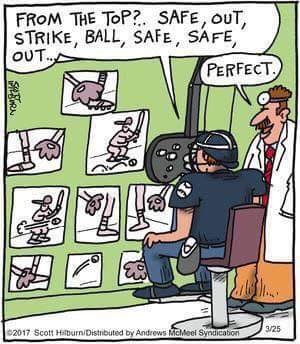The first requisite of an umpire is to ultimately get all decisions correct. Umpire pride is important, but never as important as getting the play right. It is the philosophy of the NCAA that umpires always seek to get the call right. This may involve the reversal of a previously rendered decision. However, the correct decision, not the pride of any umpire, must prevail.
Following are general guidelines for this policy:
-
No umpire shall criticize or interfere with another umpire’s decision, unless asked by the one making it; however, if there is a misinterpretation of a rule, it should be brought to the attention of the calling umpire and entire crew.
-
An umpire is urged to seek help when his/her view is blocked or positioning prevents him/her from seeing crucial elements of a play. An umpire is also encouraged to seek help in instances when he/she has any doubt and a partner has additional information that could lead to the proper ruling.
-
In the situations listed below, a partner, who is 100% certain he/she has additional information unknown to the umpire making the call, should approach unsolicited and alert the other umpire to such information. However, the ultimate decision to change a call rests with the calling umpire.
-
Deciding if a home run is fair or foul.
-
Deciding whether a batted ball left the playing field for a home run or ground rule double.
-
Cases in which a foul tip is not caught within foul tip guidelines.
-
Cases in which a foul fly ball is caught or not caught.
-
Cases when an umpire clearly errs in judgment because he/she did not see a ball dropped or juggled after a tag or force play out call.
-
Spectator interference plays.
-
Interference by coach or on deck batter on a foul ball attempted catch.
-
When you know crewman did not observe his/her calling play.
-
Coaches assist.
-
Catch and carry.
-
Umpire jeopardy.
-
Umpires are not to seek help on plays on which they are 100% confident in their judgment and view of the play. Head coaches are not entitled to a second opinion when the calling umpire is certain his/her decision is correct. On the other hand, umpires are not to “die” with a call in cases where: The calling umpire is not 100% certain he/she is right, and
-
The calling umpire is not 100% certain he/she is right, and
-
Another umpire has additional information which could lead to a proper ruling. Both NCAA philosophy and umpire integrity, consistent with NCAA rules, dictate that calls are reversed in this situation.
-
5.When an umpire seeks help, he/she should do so shortly after making the original call. He/she should not have a lengthy discussion with the head coach or others and then ask for help. If the calling umpire seeks help, he/she should include all umpires and focus on the umpire who would likely have the best position to see the elements of the play. This conversation must take place away from players or coaches. After a request for an umpire conference has been granted, coaches are not allowed to continue to argue a call once the final decision has been made. If a call is reversed, coaches are entitled to an explanation.
-
Judgment calls, which have traditionally not been subject to reversal, include steal and other tag plays (except if the ball is dropped without the umpire’s knowledge as discussed above), force plays (when the ball is not dropped and the foot is not pulled), and balls and strikes (other than half swings). This practice shall continue.

